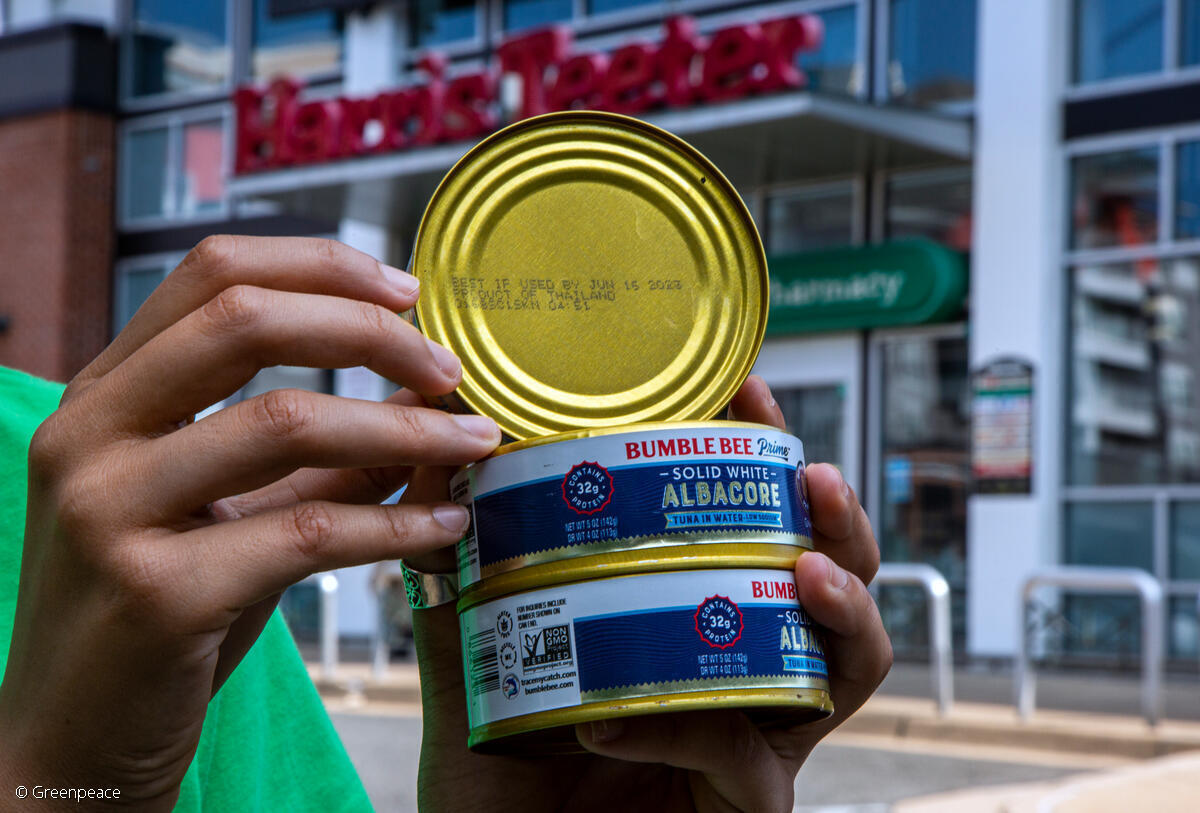
綠色和平在 2022 年 4 月 12 日於美國維吉尼亞州的連鎖超市 Harris Teeter,所收集到的大黃蜂鮪魚罐頭,經查詢得知其供貨漁船為臺灣權宜船「大旺號」,該船在 2022 年 1 月就已經被美國海關及邊境保衛局確認有強迫勞動的情況。
Washington, DC (May 1, 2024)—Today, Greenpeace USA issued an unprecedented call on U.S. Customs and Border Protection (CPB) to impose public penalties on all entities, including Bumble Bee Tuna, that were involved in the importation of tuna from the Da Wang, a fishing vessel previously sanctioned by CBP for its use of forced labor. The request, which comes on International Workers’ Day and on the eve of World Tuna Day, is being made in line with U.S. law (19 U.S. Code § 1595a(b)), which prohibits goods produced with forced labor regardless of the presence of a Withhold Release Order (WRO) or Finding, from entering the U.S., and in line with previously issued penalties. The law has been previously applied to forced labor cases in other industries, but the request to apply it in the seafood industry after a WRO is in place is a historic first. Greenpeace USA found a Bumble Bee branded can of tuna containing fish caught by the reportedly blacklisted Da Wang at an Arlington, Virginia supermarket in April 2022. The CPB has taken no action to reprimand or sanction Bumble Bee since the violation was identified.
Charli Fritzner, Greenpeace USA’s Beyond Seafood Project Lead, said: “U.S. law is clear – our markets are closed to goods produced with modern-day slavery. Bumble Bee has flouted this law by selling fish caught under proven forced labor conditions. Not only is this illegal, but it flies in the face of their claims that Bumble Bee tuna is ‘Good for You.’ It is most certainly not good for the people catching the fish in their supply chains, the sea turtles, sharks, and birds caught in indiscriminate fishing gear, nor for any of us that rely on a healthy ocean for a livable planet.”
The Da Wang had a public history of violating U.S. laws and Bumble Bee’s own policies years before tuna caught on the Da Wang was found in a Bumble Bee tuna can on a U.S. supermarket shelf. The vessel was involved in forced labor, as reported by Greenpeace Southeast Asia in 2019 and 2021. In 2020, the U.S. Customs and Border Protection (CBP) barred imports from the vessel after finding indications that it was involved in forced labor practices such as physical violence, debt bondage, withholding of wages, and abusive living and working conditions. In April 2022, nine Da Wang operators were indicted in Taiwan for forced labor and abuse after CBP found conclusive evidence of their use of forced labor in the vessel’s fishing operations. Bumble Bee’s consumer tracing platform indicates the tuna was sourced from a trip made by the Da Wang between May and October 2019.
Fritzner continued: “The conviction of the Da Wang operators was an important moment that brought some measure of justice to the affected fishers. But the Da Wang wasn’t operating solo on the high seas. Other companies profited along the way, and the tuna that those fishers caught ended up in Bumble Bee tuna cans and on the plates of American consumers in clear contravention of U.S. laws. While Bumble Bee has not publicly acknowledged or made remedies for these abhorrent practices, thousands of other vulnerable workers face the pervasive risk of harm and even death daily.”
“Companies need to know there are consequences to treating humans and our oceans as disposable. That is why we have called on the CBP to use their tools and resources to take action to their fullest extent on this vessel, this merchandise, and anyone who profited while bringing tuna caught using forced labor into the U.S. It’s time to send a clear message to U.S. seafood companies that products made with forced labor are not welcome here.”
The Greenpeace USA request to the CBP aims to force systematic change in the seafood supply chain. By exposing those practices and ensuring those benefiting are brought to justice, we can address a long history of crimes at sea, often going unseen and unpunished.
###
Contact: Tanya Brooks, Greenpeace USA Senior Communications Specialist, P: 703-342-9226, E: [email protected]
Greenpeace USA is part of a global network of independent campaigning organizations that use peaceful protest and creative communication to expose global environmental problems and promote solutions that are essential to a green and peaceful future. Greenpeace USA is committed to transforming the country’s unjust social, environmental, and economic systems from the ground up to address the climate crisis, advance racial justice, and build an economy that puts people first. Learn more at www.greenpeace.org
